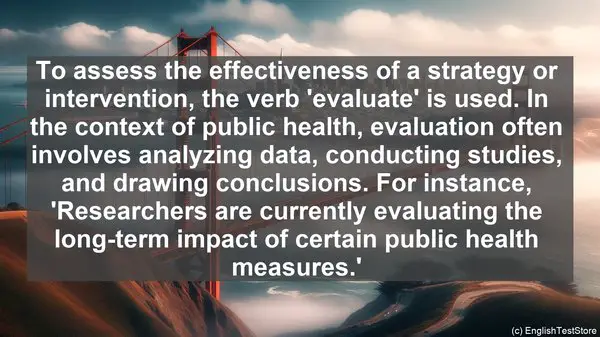Introduction
In today’s lesson, we’ll be diving into the world of pandemic response and public health strategies. As we all know, these topics have become increasingly important in recent times. Whether you’re a student studying public health or simply interested in the subject, having a strong grasp of the English vocabulary is crucial. So, let’s get started!
1. Implement
The first verb on our list is ‘implement.’ This verb is used when putting a plan or strategy into action. In the context of public health, it could refer to the implementation of vaccination drives, contact tracing measures, or even social distancing protocols. For example, ‘The government plans to implement a new testing strategy to curb the spread of the virus.’
2. Mitigate
Next up, we have ‘mitigate.’ This verb means to reduce the severity or impact of something. When it comes to public health, it often refers to efforts aimed at minimizing the effects of a disease outbreak. For instance, ‘The healthcare system is working tirelessly to mitigate the impact of the pandemic on vulnerable populations.’
3. Monitor
The verb ‘monitor’ is all about keeping a close watch on a situation. In the context of public health, it involves observing and tracking various factors, such as infection rates, hospitalizations, or the effectiveness of interventions. A sample sentence could be, ‘Health officials are constantly monitoring the situation to identify any potential outbreaks.’
4. Coordinate
When multiple entities or organizations work together towards a common goal, the verb ‘coordinate’ comes into play. In the realm of public health, coordination is essential for a smooth response. For example, ‘The local health department is coordinating with community centers to ensure widespread access to testing.’

5. Communicate
Effective communication is at the heart of any public health strategy. This verb involves not just conveying information but also ensuring its understanding and clarity. A sentence could be, ‘The health agency regularly communicates updates and guidelines to the public through various channels.’

6. Evaluate
To assess the effectiveness of a strategy or intervention, the verb ‘evaluate’ is used. In the context of public health, evaluation often involves analyzing data, conducting studies, and drawing conclusions. For instance, ‘Researchers are currently evaluating the long-term impact of certain public health measures.’
7. Adapt
Given the dynamic nature of public health challenges, the ability to ‘adapt’ is crucial. This verb refers to making changes or adjustments based on new information or evolving circumstances. A sample sentence could be, ‘In response to the emerging variant, the vaccination strategy had to be adapted.’
8. Advocate
Sometimes, public health initiatives require active support or promotion. That’s where the verb ‘advocate’ comes in. It involves speaking up for a cause or policy. For example, ‘The organization advocates for increased funding for mental health services.’
9. Collaborate
Similar to ‘coordinate,’ ‘collaborate’ emphasizes working together. However, collaboration goes beyond just task allocation and involves active participation and shared decision-making. In the field of public health, collaboration between researchers, policymakers, and healthcare providers is vital. A sentence could be, ‘The international community is collaborating to develop a unified response to global health threats.’
10. Educate
Last but certainly not least, we have ‘educate.’ Public health is not just about implementing measures but also ensuring that individuals have the knowledge and understanding to make informed decisions. For instance, ‘The campaign aims to educate the public about the importance of hand hygiene.’
